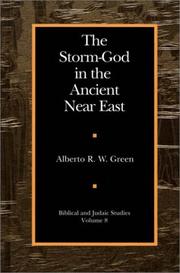| Listing 1 - 2 of 2 |
Sort by
|

ISBN: 1575065371 9781575065373 1575060698 9781575060699 Year: 2021 Publisher: University Park, PA
Abstract | Keywords | Export | Availability | Bookmark
 Loading...
Loading...Choose an application
- Reference Manager
- EndNote
- RefWorks (Direct export to RefWorks)
In this comprehensive study of a common deity found in the ancient Near East as well as many other cultures, Green brings together evidence from the worlds of myth, iconography, and literature in an attempt to arrive at a new synthesis regarding the place of the Storm-god. He finds that the Storm-god was the force primarily responsible for three major areas of human concern: (1) religious power because he was the ever-dominant environmental force upon which peoples depended for their very lives; (2) centralized political power; and (3) continuously evolving sociocultural processes, which typically were projected through the Storm-god's attendants. Green traces these motifs through the Mesopotamian, Anatolian, Syrian, and Levantine regions; with regard to the latter, he argues that Yahweh of the Bible can be identified as a storm-god, though certain unique characteristics came to be associated with him: he was the Creator of all that is created and the self-existing god who needs no other.
Storm gods --- Gods, Semitic. --- Semitic gods --- Semites --- Gods --- Religion --- Middle East --- Religion. --- Windgott --- Wettergott --- Storm gods. --- Religion, Primitive --- Atheism --- Irreligion --- Religions --- Theology --- Naher Osten --- Alter Orient --- Middle East. --- Orient --- Asia, South West --- Asia, Southwest --- Asia, West --- Asia, Western --- East (Middle East) --- Eastern Mediterranean --- Fertile Crescent --- Levant --- Mediterranean Region, Eastern --- Mideast --- Near East --- Northern Tier (Middle East) --- South West Asia --- Southwest Asia --- West Asia --- Western Asia --- Wettergott. --- Sturmgott --- Windgötter --- Götter --- Eastern Mediterranean Region --- South West --- Asia --- Naher Orient --- Vorderasien --- Vorderer Orient --- Südwestasien --- Asien --- Nahost --- Moyen-Orient --- Westasien --- Levante --- Südwestasien
Book

ISBN: 1575062542 9781575062549 9781575068886 1575068885 Year: 2021 Publisher: University Park, PA
Abstract | Keywords | Export | Availability | Bookmark
 Loading...
Loading...Choose an application
- Reference Manager
- EndNote
- RefWorks (Direct export to RefWorks)
In July, 2009, the International Association for Assyriology met in Paris, France, for 5 days to deliver and listen to papers on the theme “La famille dans le Proche-Orient.” This volume, the proceedings of the conference, contains 53 of the papers read at the 55th annual Rencontre, including primarily papers directly connected with the theme and some on areas of related interest. The papers covered every period of Mesopotamian history, from the third millennium through the end of the first millennium B.C.E. The photo on the back cover shows only a representative portion of the attendees, who were warmly hosted by faculty and students from the Collège de France.
Families -- Middle East -- History -- To 1500 -- Congresses. --- Middle East -- Antiquities -- Congresses. --- Middle East -- Civilization -- To 622 -- Congresses. --- Middle East -- Social life and customs -- Congresses. --- Social archaeology -- Middle East -- Congresses. --- Families --- Social archaeology --- Regions & Countries - Asia & the Middle East --- History & Archaeology --- Middle East --- History --- Antiquities. --- Civilization. --- Families. --- Manners and customs. --- Social archaeology. --- To 1500. --- Middle East. --- Antiquities --- Civilization --- Social life and customs --- Famille --- Droit antique --- Archaeology --- Family --- Family life --- Family relationships --- Family structure --- Relationships, Family --- Structure, Family --- Social institutions --- Birth order --- Domestic relations --- Home --- Households --- Kinship --- Marriage --- Matriarchy --- Parenthood --- Patriarchy --- Methodology --- Social aspects --- Social conditions --- Asia, South West --- Asia, Southwest --- Asia, West --- Asia, Western --- East (Middle East) --- Eastern Mediterranean --- Fertile Crescent --- Levant --- Mediterranean Region, Eastern --- Mideast --- Near East --- Northern Tier (Middle East) --- South West Asia --- Southwest Asia --- West Asia --- Western Asia --- Orient --- Droit antique. --- Sozialarchäologie --- Familie --- Conference proceedings. --- SOCIAL SCIENCE --- POLITICAL SCIENCE --- Administration --- Civil government --- Commonwealth, The --- Government --- Political theory --- Political thought --- Politics --- Science, Political --- Social sciences --- State, The --- Behavioral sciences --- Human sciences --- Sciences, Social --- Social science --- Social studies --- Archaeological specimens --- Artefacts (Antiquities) --- Artifacts (Antiquities) --- Specimens, Archaeological --- Material culture --- Barbarism --- Civilisation --- Auxiliary sciences of history --- Culture --- World Decade for Cultural Development, 1988-1997 --- Ceremonies --- Customs, Social --- Folkways --- Social customs --- Traditions --- Usages --- Ethnology --- Etiquette --- Rites and ceremonies --- Convention proceedings --- Meeting proceedings --- Proceedings of conferences --- Congresses and conventions --- Popular Culture. --- Anthropology --- Cultural. --- Public Policy --- Cultural Policy. --- Naher Osten --- Familien --- Ehe --- Lineage --- Archäologie --- Eastern Mediterranean Region --- South West --- Asia --- Naher Orient --- Vorderasien --- Vorderer Orient --- Südwestasien --- Asien --- Nahost --- Moyen-Orient --- Westasien --- Levante --- Alter Orient --- Südwestasien --- Archäologie
| Listing 1 - 2 of 2 |
Sort by
|

 Search
Search Feedback
Feedback About UniCat
About UniCat  Help
Help News
News